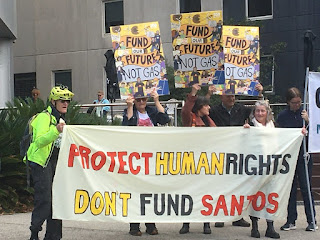“The Korean government agencies funding and insuring the Barossa gas project face significant and mounting risks on two fronts — native title and climate-related risks.” says an April IEEFA report.
The Barossa Gas project is located in Sea Country associated with the Tiwi Island in the Northern Territory. This Gas field has extremely high levels of CO2.
A protest was held organised by the Beyond Gas Network outside the South Korean Consulate on St Kilda Road, Melbourne on Thursday 4 May, 2023. A letter addressed to the President of Republic of Korea via the Consul general was attempted to be presented.
Santos has failed to consult with indigenous nations on this project. The Tiwi Islanders took this lack of consultation to the Federal Court in September 2022 and their case was upheld. Santos appealed the decision and in December 2022 the full bench of the Federal Court dismissed the appeal and upheld the original decision. Santos has had to stop all preliminary drilling work and pipeline work
This means Santos needs to restart their consultation phase, including assessment of cultural heritage and environmental impacts. This has set back the project by perhaps 2 years.
Adding to the project risks, the Federal Court in a historic decision in March 2023, granted native title over the seas around the Tiwi Islands to the Tiwi Island indigenous community.
But this project is being funded by South Korean government Agencies: the Export-Import Bank of Korea (Kexim) and the Korea Trade Insurance Corp (K-Sure) are risking Korean public money by financing SK E&S’ investment in the Santos Barossa gas project.Alltogether, nine private financial institutions have poured a collective $1.15 billion into the Barossa gas project despite most having committed to net-zero emissions, reports Renew Economy.
To appease financial backers Santos is proposing Carbon Capture and Storage (CCS) in the Bayu-Undan CCS project. This project is over 800 kilometres away via a pipeline going through Darwin. Initial carbon emissions are likely to be just vented. Even when the infrastructure is in place, there will be fugitive emissions in the compression, transport and sequestration of this carbon dioxide.
Renew Economy reports:
The Barossa project is expected to release 13.5 million tonnes of CO2 equivalent per year, amounting to around 3% of Australia’s annual carbon emissions, even, according to the report, with proposed carbon capture and storage (CCS).
Remember Barossa field has an extremely high CO2 content as part of the gas production.
Projects such as Chevron's Gorgon CCS project show that carbon capture and storage have not been able to sequester CO2 at the rates promised. CCS was supposedly incorporated from the start of this project with burial close to the gas field beneath Barrow Island.
Chevron's Pluto gas field hasn't been closed down, but been allowed to continue. Santos is banking their project once in production will not be closed down due to a failure in CCS sequestration when the Barossa Field is already in production.
Regardless of whether a new CCS project could be identified and undertaken, it would not solve the emissions problems from gas. No new gas projects can be contemplated if we are to achieve net zero by 2050, according to the International Energy Agency. Even if the CCS project were successful, it would not solve the emissions problem. Typically between 85% and 90% of emissions from LNG are made when the gas is burnt. Any CCS project only addresses part of the 10–15% of emissions that occur when the gas is produced — making it an ineffective solution.It is well past time for the Korean government to review its decision to back the Barossa project in light of the extensive problems it has faced and increasing climate risks. Investments are made with long-term trends in mind. The trends affecting this project are unfavourable, and value is being destroyed for Korean companies and government agencies.
Leigh Naunton from Beyond Gas Network explaining the issues with the Santos' Barossa Gas Project:
References
- Bruce Robertson, IEEFA, SK E&S, K-Sure and Kexim face rising and unquantified risks with their backing of the Barossa gas project off Northern Australia, 3 April 2023 https://ieefa.org/resources/sk-es-k-sure-and-kexim-face-rising-and-unquantified-risks-their-backing-barossa-gas
- Amalyah Hart, Renew Economy, 18 April 2023, Banks committed to net zero fund “Australia’s dirtiest” offshore gas project, report finds https://reneweconomy.com.au/banks-committed-to-net-zero-fund-australias-dirtiest-offshore-gas-project-report-finds/
- Photos and video by John Englart, CC-by-SA licensed.
Background
- Australia Institute, Barossa Area Development Offshore Project Proposal (Submission to the Japan Bank for International Cooperation), April 27, 2021 by Liam Carter, Jason Fowler and Luke Fletcher, https://australiainstitute.org.au/report/barossa-area-development-offshore-project-proposal/
- Jubilee Australia - Stop Barossa Gas Campaign https://www.jubileeaustralia.org/our-impact-areas/climate-justice/stop-barossa-gas




No comments:
Post a Comment